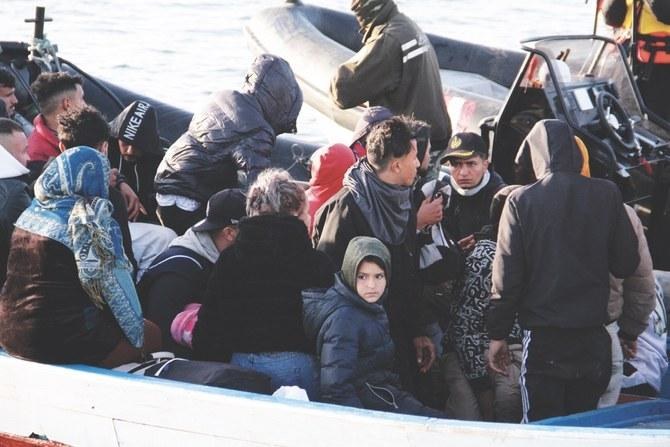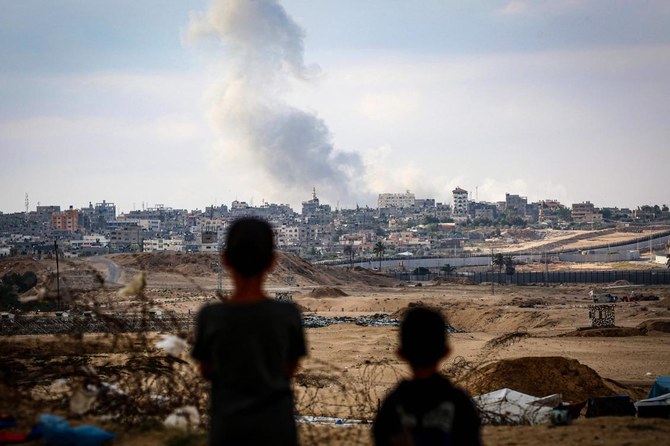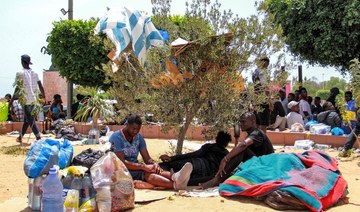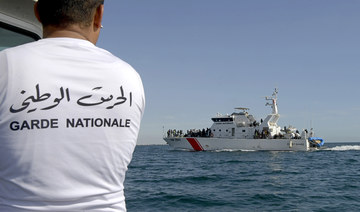TUNIS: At least 500 migrants from sub-Saharan Africa have been transferred back to Tunisia after being pushed into a dangerous no-man’s-land on the Libyan border and trapped for a week there without access to basic necessities, aid agencies said Tuesday.
The group was driven out earlier this month amid a spike in anti-migrant and racism-fueled tensions linked to a killing in the Tunisian port city of Sfax, a hub for traffickers organizing risky and sometimes deadly boat journeys across the Mediterranean Sea to Italy.
One such boat sank Sunday off the Tunisian coast. Coast guard officers retrieved one body, rescued 11 people and declared 10 others as missing, the Sfax prosecutor’s office said.
The fate of hundreds of migrants pushed into the Tunisia-Libya border region drew concern from international humanitarian groups. It also raised questions about Tunisia’s migration policies, weeks after the European Union offered Tunisia’s increasingly authoritarian government $1 billion to help its slumping economy — and to beef up border services to stop migrant boats from crossing to Europe.
A 29-year-old man from Ivory Coast said that uniformed men had taken migrants from their homes in Sfax in the middle of the night in early July and brought some 600 people to the border area between the Mediterranean Sea and the Tunisian-Libyan land border near Ben Guerdane.
Speaking to The Associated Press last week, he accused the Tunisian National Guard of beating them “like animals, like slaves,” and assaulting women in the group. He claimed that Libyan security at the border fired shots into the air to keep the civilians at bay.
The name of the man, who said he entered Tunisia legally in 2019 and works on a golf course, is being withheld for safety reasons.
On Tuesday, he said that he and 100 others have now been transferred away from the border to the inland Tunisian town of Medenine, where they are sleeping in a courtyard. Temperatures in the area climbed above 40 degrees Celsius (104 Fahrenheit) on Tuesday.
Tunisian Red Crescent spokesperson Mounir Ksiksi said Tuesday that about 500 people from sub-Saharan Africa who had been trapped in the border zone were transferred Monday to other regions of Tunisia.
A spokesperson for the International Organization for Migration said 158 migrants were transferred to a shelter in the town of Tataouine and another 353 people transferred to public structures in Medenine. The IOM said Tunisian authorities have not provided information about next steps for the migrants.
Under pressure from humanitarian agencies, Tunisian President Kais Saied on Sunday ordered the Tunisian Red Crescent to bring aid to the migrants. Saied stoked racist incidents earlier this year by railing at Black Africans who transit through Tunisia toward Europe.
On Monday, Saied denied mistreatment of migrants by Tunisian authorities, and lashed out at migrant traffickers he said were seeking to “destabilize Tunisia.” He called for coordinated efforts to “to tackle the origins, sources and causes of the problem” in addition to security measures.
Tunisian Red Crescent head Abdellatif Chabou said he headed to the border region to oversee an operation to bring food and water to the migrants and allow them to contact their families. Three people needing medical aid were transferred to a local hospital, including a pregnant woman, Chabou told local broadcaster Radio Mosaique on Monday.
The president of the Tunisian Human Rights Observatory, Mustapha Abdelkebir, said the migrants had no access to basic sanitation and were trapped between armed forces on either side of the border, exposed to extreme heat without shelter.
The International Organization for Migration said it was working with Tunisian authorities to ensure humanitarian assistance, and called on Tunisia to respect “the dignity and rights of all migrants” and to counter “harmful and negative rhetoric, hate speech and hate crimes.”
The Tunisian Human Rights League called for a crisis center to address the tensions in Sfax.
Opposition politician Nejib Chebbi accused authorities of stoking prejudice and deporting the migrants “because they are Black. It is a disgrace, and this will remain a dark page in our history.”
Reports have also emerged of migrants pushed back to Tunisia’s border with Algeria, whose government routinely expels migrants south into the Sahara desert. Tunisia’s Defense Ministry would not comment Tuesday on the reports.
Under pressure, Tunisia takes back hundreds of migrants trapped in a border zone with Libya
https://arab.news/8q9hx
Under pressure, Tunisia takes back hundreds of migrants trapped in a border zone with Libya

- Migrants were trapped for a week without access to basic necessities
Erdogan says Israel will ‘set sights’ on Turkiye if Hamas defeated

- Turkish leader on Monday said more than 1,000 members of Hamas were being treated in Turkish hospitals
Erdogan, a vocal critic of Israel’s war in the Palestinian territory following Hamas’s attack on October 7, has often expressed support for the Palestinian group as defenders of their homeland.
Hamas is classed as a terrorist organization by Israel, the United States and the European Union, among others.
“Do not think that Israel will stop in Gaza,” Erdogan told his party lawmakers in the parliament in the capital Ankara.
“Unless it’s stopped... this rogue and terrorist state will set its sights on Anatolia sooner or later,” he said, referring to the large Turkish peninsula also called Asia Minor that comprises more than half of Turkiye’s territory.
“We will continue to stand by Hamas, which fights for the independence of its own land and which defends Anatolia,” added Erdogan.
The Turkish leader on Monday said more than 1,000 members of Hamas were being treated in Turkish hospitals amid the ongoing war in Gaza.
The October 7 attack on Israel resulted in the deaths of more than 1,170 people, mostly civilians, according to an AFP tally based on Israeli official figures.
Militants also seized some 250 hostages, 128 of whom Israel estimates remain in Gaza, including 36 the military says are dead.
Israel’s bombardment and offensive in Gaza have killed more than 35,000 people, mostly women and children, according to the health ministry in the Hamas-run territory.
EU urges Israel to end Rafah military operation ‘immediately’

- EU statement: ‘Further disrupting the distribution of humanitarian aid in Gaza and is leading to more internal displacement, exposure to famine and human suffering’
BRUSSELS: The European Union on Wednesday urged Israel to end its military operation in Gaza’s Rafah “immediately,” warning that failure to do so would undermine ties with the bloc.
“Should Israel continue its military operation in Rafah, it would inevitably put a heavy strain on the EU’s relationship with Israel,” said the statement issued in the EU’s name by its foreign policy chief Josep Borrell.
“The European Union urges Israel to end its military operation in Rafah immediately,” the statement said, warning it was “further disrupting the distribution of humanitarian aid in Gaza and is leading to more internal displacement, exposure to famine and human suffering.”
The bloc — the main aid donor for the Palestinian territories and Israel’s biggest trading partner — said more than a million people in and around Rafah had been ordered by Israel to flee the area to other zones the UN says cannot be considered safe.
“While the EU recognizes Israel’s right to defend itself, Israel must do so in line with International Humanitarian Law and provide safety to civilians,” it said.
The law requires Israel to allow in humanitarian aid, the statement stressed.
The EU also condemned a Hamas attack on the Kerem Shalom border crossing which blocked humanitarian relief supplies.
“We call on all parties to redouble their efforts to achieve an immediate ceasefire and the unconditional release of all hostages held by Hamas,” it said.
Israel’s military operations in Gaza were launched in retaliation for Hamas’s October 7 attack on Israeli which killed more than 1,170 people, mostly civilians, and saw around 250 hostages taken, according to an AFP tally of Israeli official figures.
Israel’s military has conducted a relentless bombardment from the air and a ground offensive inside Gaza that has killed more than 35,000, mostly civilians, according to the Gaza health ministry.
Israel’s main allies, the United States and the EU, as well as the United Nations, have all warned Israel against a major operation in Rafah given that it would add to the civilian toll.
Kuwait’s emir calls on new government to pursue reforms

RIYADH: Kuwait’s Emir Sheikh Mishal Al-Ahmad Al-Jaber Al-Sabah on Wednesday met with the new prime minister and his government.
According to the Kuwait News Agency, Sheikh Mishal said: “We are in a new phase of reforms and serious actions must be taken.”
He added that ministers should “accelerate the implementation of long-awaited strategic development projects, address needed files and work on the infrastructure projects, develop healthcare and the educational system, and take into account transparency and to preserve public funds.”
Sheikh Mishal appointed Sheikh Ahmad Abdullah Al-Ahmad Al-Sabah as prime minister in April, and dissolved parliament last Friday in a televised speech.
He urged ministers to ensure that Kuwait has a strong and sustainable economy by investing in human capital and promoting innovation and scientific research.
UN launches probe into first international staff killed by unidentified strike in Rafah

- Retired Indian army officer Waibhav Anil Kale was on route to the European Hospital in Rafah along with a colleague, who was also injured in the attack
NEW DELHI: The United Nations has launched an investigation into an unidentified strike on a UN car in Rafah on Monday that killed its first international staff in Gaza since Oct. 7, a spokesperson for the UN Secretary General said.
The staff member, a retired Indian Army officer named Waibhav Anil Kale, was working with the UN Department of Safety and Security and was on route to the European Hospital in Rafah along with a colleague, who was also injured in the attack.
Israel has been moving deeper into Rafah in southern Gaza, where more than a million people had sought shelter, and its forces pounded the enclave’s north on Tuesday in some of the fiercest attacks in months.
Israel’s international allies and aid groups have repeatedly warned against a ground incursion into Rafah, where many Palestinians fled, and Israel says four Hamas battalions are holed up. Israel says it must root out the remaining fighters.
In a statement on Monday after Kale’s death, UN Secretary General Antonio Guterres reiterated an “urgent appeal for an immediate humanitarian ceasefire and for the release of all hostages,” saying the conflict in Gaza was continuing to take a heavy toll “not only on civilians, but also on humanitarian workers.”
Palestinian health authorities say Israel’s ground and air campaign in Gaza since Oct. 7 has killed more than 35,000 people and driven most of the enclave’s 2.3 million people from their homes.
His deputy spokesperson Farhan Haq said on Tuesday the UN has established a fact-finding panel to determine the responsibility for the attack.
“It’s very early in the investigation, and details of the incident are still being verified with the Israeli Defense Force,” he said.
There are 71 international UN staff members in Gaza currently, he said.
In its only comment on the matter yet, India’s mission to the UN confirmed Kale’s identity on Tuesday, saying it was “deeply saddened” by his loss.
Israel, which launched its Gaza operation after an attack on Oct. 7 by Hamas-led gunmen who killed some 1,200 people and took more than 250 hostages, according to its tallies, has ordered civilians to evacuate parts of Rafah.
The main United Nations aid agency in Gaza, UNRWA estimates some 450,000 people have fled the city since May 6. More than a million civilians had sought refuge there.
Libya war crimes probe to advance next year: ICC prosecutor

- The Security Council referred the situation in Libya to the ICC in February 2011 following a violent crackdown on unprecedented protests against the regime of Muammar Qaddafi
UNITED NATIONS, United States: The International Criminal Court prosecutor probing war crimes committed in Libya since 2011 announced Monday his plans to complete the investigation phase by the end of 2025.
Presenting his regular report before the United Nations Security Council, Karim Khan said that “strong progress” had been made in the last 18 months, thanks in particular to better cooperation from Libyan authorities.
“Our work is moving forward with increased speed and with a focus on trying to deliver on the legitimate expectations of the council and of the people of Libya,” Khan said.
He added that in the last six months, his team had completed 18 missions in three areas of Libya, collecting more than 800 pieces of evidence including video and audio material.
Khan said he saw announcing a timeline to complete the investigation phase as a “landmark moment” in the case.
“Of course, it’s not going to be easy. It’s going to require cooperation, candor, a ‘can do’ attitude from my office but also from the authorities in Libya,” he added.
“The aim would be to give effect to arrest warrants and to have initial proceedings start before the court in relation to at least one warrant by the end of next year,” Khan said.
The Security Council referred the situation in Libya to the ICC in February 2011 following a violent crackdown on unprecedented protests against the regime of Muammar Qaddafi.
So far, the investigation opened by the court in March 2011 has produced three cases related to crimes against humanity and war crimes, though some proceedings were abandoned after the death of suspects.
An arrest warrant remains in place for Seif Al-Islam Qaddafi, the son of the assassinated Libyan dictator who was killed by rebel forces in October 2011.
Libya has since been plagued by fighting, with power divided between a UN-recognized Tripoli government and a rival administration in the country’s east.




















